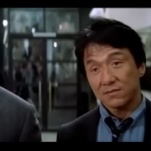Esther Kahn

With her dark complexion, slightly shifty eyes, and cold, austere demeanor, Summer Phoenix has a screen presence that's simultaneously distancing and transfixing, an inscrutability that makes her seem either mysterious or a complete blank. For this reason, her performance in Arnaud Desplechin's riveting Esther Kahn has polarized response since the film premiered at Cannes in 2000, but rarely has a role been so well tailored to an actor's abilities and limitations. As a mirthless outcast in a tight-knit Jewish family in Victorian England, Phoenix stares down the difficult challenge of playing half a person&–a young woman capable of feeling rage, frustration, and anxiety, but incapable of love, empathy, and other warmer emotional registers. Her talent for mimicry leads naturally to an attraction to the theater, where actors are applauded for pretending to be real, something she does every day. Expanded to epic length from a short story by Arthur Symons, Esther Kahn follows Phoenix's unlikely ascent in the acting world, a long, perilous journey in which the slow development of her craft dovetails brilliantly with her quest to be fully human. In the opening section, Desplechin (My Sex Life… Or How I Got Into An Argument) takes a hard look at life in the early Industrial Age, evoking working-class squalor with refreshingly plain, unburnished images that scrape away the gold-hued nostalgia of most period pieces. A slow and indifferent worker, unable to do her share for the family, Phoenix gets a bit part in a local theater production, and soon lands enough supporting roles to afford her own place while sending money back home. Eager to become a better actress, she takes lessons from second-rate actor Ian Holm, who recognizes that her inability to fully embody a part is related to her off-stage shortcomings. In her reckless pursuit of real-life experience and emotions, Phoenix dives into a self-destructive relationship with playwright and drama critic Fabrice Desplechin (the director's brother), while preparing for her first lead role in Ibsen's Hedda Gabler. Surely among the most complex and beguiling films ever made about the craft of acting, Esther Kahn examines the tricky interplay between cool technique and hot emotion, and how performance and real life can sometimes bleed into each other. A polished actress might have made the central character more accessible, but the director's triumphs are hard-won and almost perversely unsentimental, to the point where he draws out her wrenching anxiety before a performance, then silences her as soon as she reaches the stage. In following a character that needs more from acting than applause, Esther Kahn never sticks around for a curtain call.







































